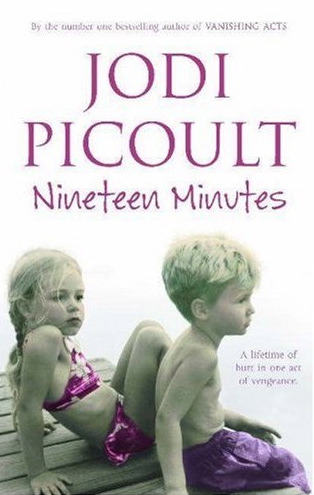A friend recently asked me to
recommend her a book that I had liked and that she could take to the beach with
her; she specifically asked for “something light but not too flowery or full of
fluff.” I’ve read several books that meet these requirements, one of which is Jodi
Picoult’s Nineteen Minutes:
Riveting, startling, poignant.
These are the 3 words I would use to describe this book.
Because life has an awful lot of
gray areas, because matters aren’t always as black and white and hideous crimes
not necessarily the acts of evil monsters as often portrayed in the media.
The events depicted throughout
this novel are the end result of an overly religious society that values
individualism above community, that embodies the old adage “an eye for an eye, a tooth for a tooth”
and believes that people are either good or evil personified. This is a society
where so many of its members often spew out the slogan “it is what it is” without questioning anything, where governmental preventive
measures are viewed as a drain on taxpayers resources and where so many mental
health laws never saw the light of day because, until recently, psychiatry was
considered a tactic utilized by Russian spies to promote defeatism among
Americans; unfortunately, this is also a society where so many of its members
continue to view mental illness such as depression with shame and as a sign of
weakness. A society that confuses “mitigating factors” with “excuses” and in
which (as a result of all this) “revenge” and “justice” are often used
interchangeably. In essence, a society desensitized to another’s plight.
Although we frequently make life harder
than what it actually is, there are also plenty of complex issues that should
be analyzed and dealt with appropriately – before it’s too late.
I do not believe in truly evil
people and I do not believe that a person who commits a hideous crime is beyond
redemption. I also do not believe that people are either good or evil
personified. Even the worst psychopath is capable of at least one act of
kindness in his lifetime. Instead, I believe that human being are very complex
creatures, and I believe in the possibility of punishing criminals while
leaving their dignity intact. I am also a firm believer in preventive measures
and in the power of education.
Instead, we live in an
over-worked, over-medicated, hateful society. We are angry, we have our own
problems, we have no time or disposition to deal with anybody else’s. This
leaves us indifferent and apathetic to another’s struggles. We “feel sorry” for
them until they commit a crime, then we dehumanize them, label them “evil” and either
incarcerate them in inhumane conditions or send them to death row – all the
while begrudging them as recipients of our hard-earned tax dollars. We don't
care about what may have led an otherwise good person to commit a crime. We
have no interest in treating (or preventing) those underlying conditions, as we
frequently forget that we do not all react the same way to the same stressors;
just because one person dealt with a particular problem one way, it does not
necessarily mean that another person will react the exact same way to the exact
same nightmare. We seem to forget (or just plain ignore) this little tidbit.
This is because it is so much easier to simplify complex issues without
analyzing underlying mitigating factors; it is so much easier (and cheaper) to just
want to punish these unproductive good-for-nothing wretches and throw away the
keys. Out of sight, out of mind.
In Nineteen Minutes Picoult deals
with two very common occurrences in our troubled schools: bullying and
shootings. She depicts all the characters with dignity and does not dehumanize
the culprits; she handles all events without making excuses or passing blame,
which is what frequently happens whenever such incidents dominate the national
news.
This book also struck a chord
with me for the following reason: although daily occurrences in our inner-city
public schools (most attended by minorities) school bullying, violence and
school shootings are never talked about; on the other hand, whenever a tragedy
such as this one strikes small-town America mainly inhabited by white folks,
that’s all you hear on the news for days, sometimes weeks.
"Everyone
would remember Peter for nineteen minutes of his life, but what about the other
nine million?"


Sem comentários:
Enviar um comentário
(Insultos e SPAM serão eliminados)